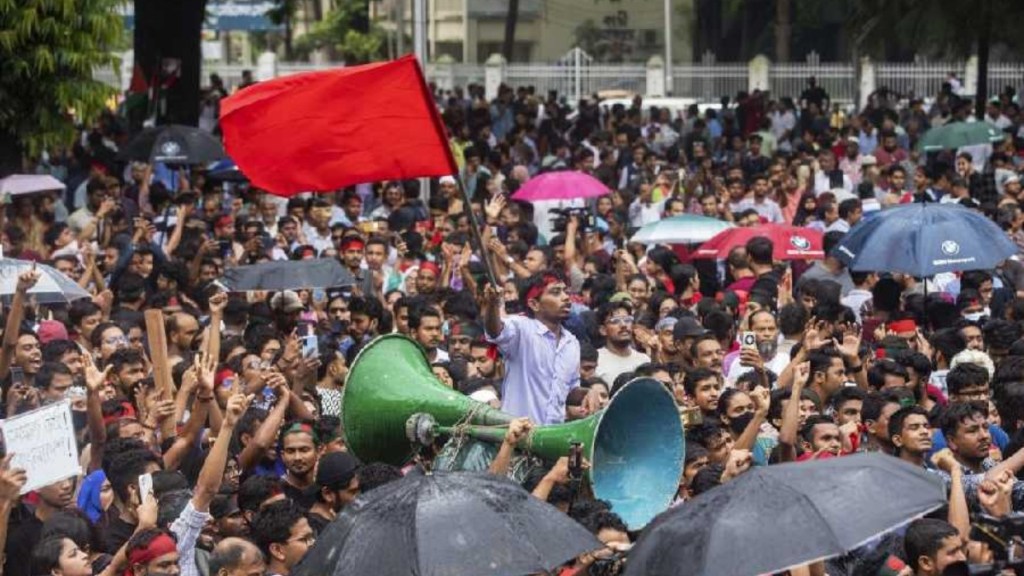At least 18 people were killed and dozens injured on Sunday in fierce clashes between protestors and supporters of the ruling Awami League in Bangladesh, as protests over a government jobs quota continued with demands for Prime Minister Sheikh Hasina’s resignation.
These fresh clashes erupted just days after over 200 people were killed in violent encounters between police and mostly student protesters demanding an end to the controversial quota system, which reserved 30% of government jobs for relatives of veterans who fought in Bangladesh’s 1971 War of Independence.
The violence broke out this morning when protesters participating in a non-cooperation program to demand the government’s resignation were met with opposition from Awami League, Chhatra League and Jubo League activists.
“At least 18 people were killed and numerous others injured in a series of deadly clashes that broke out in several parts of the country centering on the non-cooperation movement under the banner of the Anti-Discrimination Student Movement,” reported the Dhaka Tribune newspaper.
Nationwide curfew imposed
The Home Ministry decided to impose an indefinite countrywide curfew starting at 6 pm on Sunday.
Meanwhile, Prime Minister Hasina declared that those engaging in sabotage in the name of protest across Bangladesh were not students but terrorists, and she urged the public to suppress them firmly.
Hasina convened a meeting of the National Committee on Security Affairs at Ganabhaban, according to sources from the Prime Minister’s Office (PMO).
“I appeal to the countrymen to suppress these terrorists with a firm hand,” she said.
The meeting was attended by chiefs of the Army, Navy, Air Force, police, RAB, BGB, and other top security officers.
The meeting came as renewed violence spread to several parts of the country.
Multiple fatalities and injuries reported
In Rangpur, four Awami League supporters were killed and over 100 people injured, while two people were killed in both Bogra and Magura, where a Chhatra Dal leader was among the dead, the paper added.
In Sirajganj, at least four people were killed and many injured in clashes between protesters, Awami League activists and police.
In Comilla, a Jubo Dal activist was killed and 15 people, including three children, were injured during clashes between Awami League and protesters. Most shops and malls in Dhaka were closed amid the protest.
Students and professionals demand PM hasina’s resignation
Hundreds of students and professionals gathered at Dhaka’s Shahbagh, blocking traffic on all sides. The protesters, under the banner of the Anti-Discrimination Students Movement, chanted slogans calling for Prime Minister Hasina’s resignation and justice for those killed in the recent violence surrounding the quota reform protests, Bdnews24 reported.
Protesters also gathered at the Science Lab intersection of the capital on the first day of the non-cooperation movement, chanting anti-government slogans.
According to the Daily Star newspaper, several vehicles at Bangabandhu Sheikh Mujib Medical University (BSMMU) were torched on Sunday by unidentified individuals.
People carrying sticks vandalised private cars, ambulances, motorcycles and buses on the hospital premises, triggering fear among patients, their attendants, doctors and staff.
Protesters dismissed Hasina’s invitation for dialogue aimed at quelling the escalating violence and consolidated their demands into a unified call for the government’s resignation.
Protest coordinators called on students from schools, colleges, universities, private universities, and madrasas, as well as workers, professionals, political activists, and other members of the public to participate in the protests.
On Saturday, while a large student rally in Dhaka to announce their demand for a single-point agenda proceeded without incident, clashes erupted in various other parts of the country.
A trader was killed and at least 20 others were injured in these incidents.
There have been reports of vandalism and arson attacks on police vehicles and government buildings in multiple locations.
In Chattogram, the residences of Education Minister Mohibul Hasan Chowdhury Nowfel and Chattogram City Corporation Mayor Rezaul Karim Chowdhury, as well as the office of AL MP Md Mohiuddin Bachchu, were attacked.
In apparent retaliation, the homes of several Opposition Bangladesh Nationalist Party (BNP) leaders, including Standing Committee member Amir Khosru Mahmud Chowdhury, were targeted.
The BNP and its allies, along with numerous political, professional, and cultural groups, have thrown their support behind the student-led movement demanding reforms to the government job quota system.
In response, the Awami League has planned a series of demonstrations on Sunday, including ward-level sit-ins and processions, heightening public concern amid the standoff between the two camps.
Prime Minister Hasina offered to sit for talks on Saturday with the coordinators of the Anti-Discrimination Student Movement.
“The doors of Ganabhaban are open,” she said. “I want to sit with the quota protesters. I want to hear what they have to say. I do not want clashes.” However, the movement’s coordinators rejected the proposal.
Later, Hasina called an emergency meeting with university vice-chancellors and college principals.
With inputs from PTI


